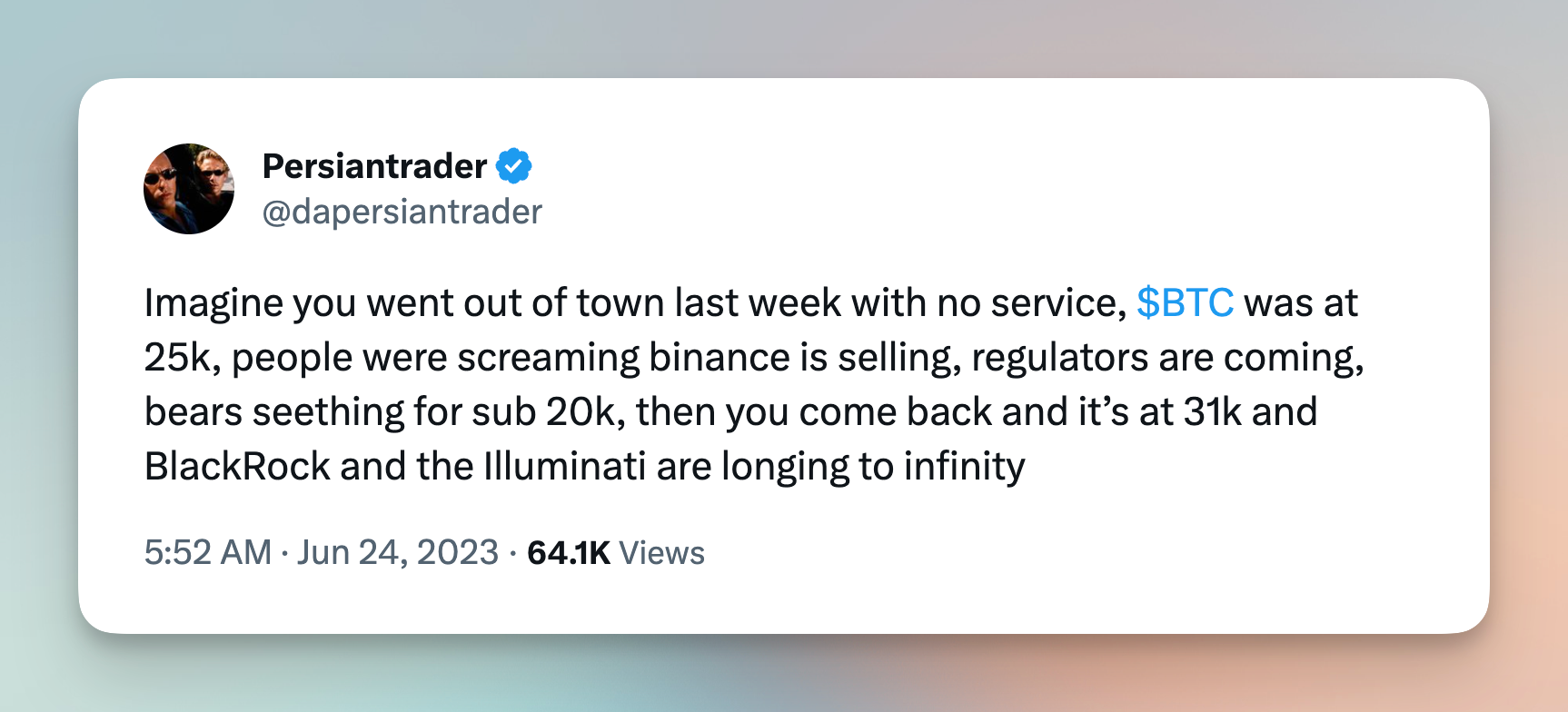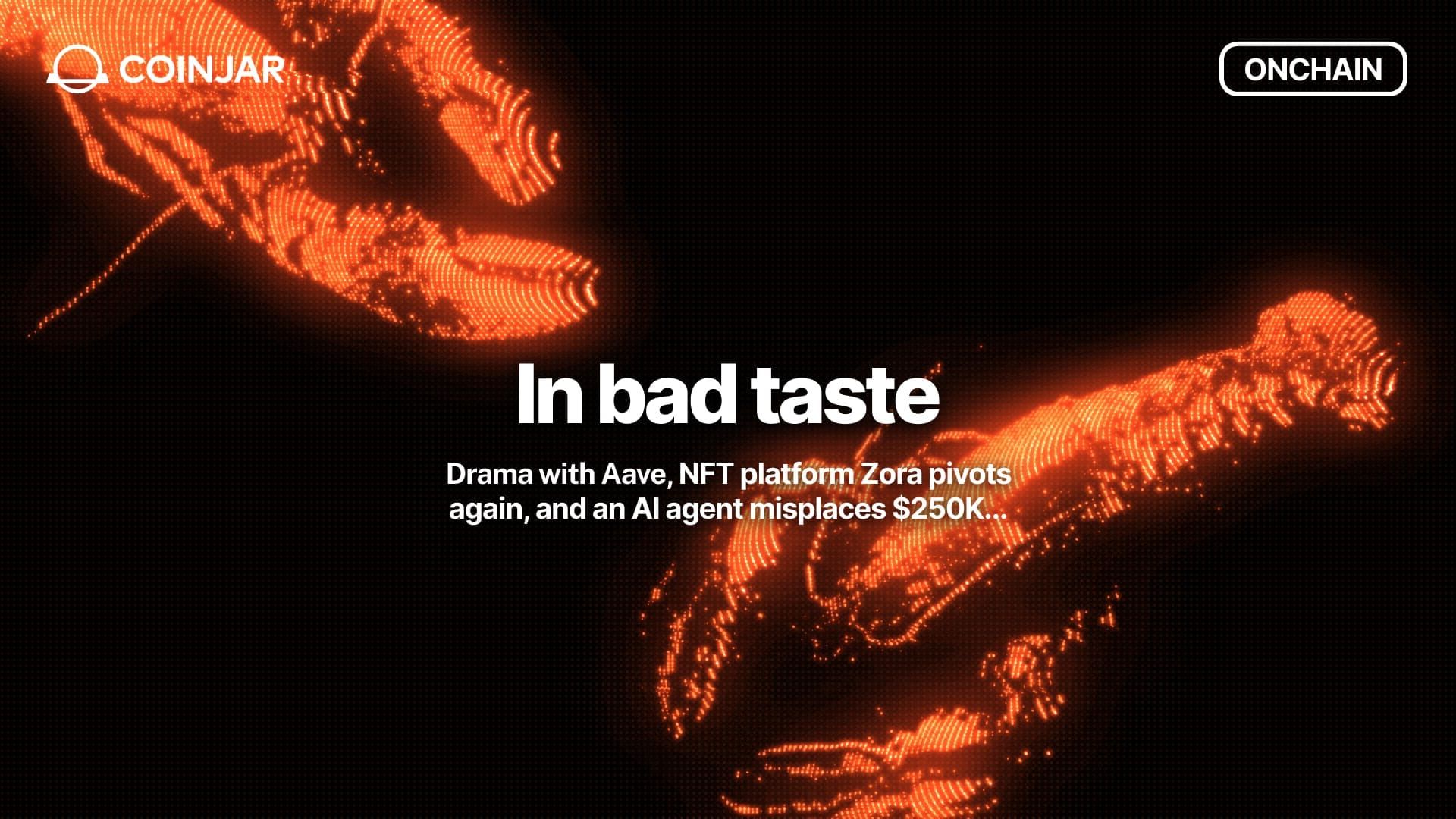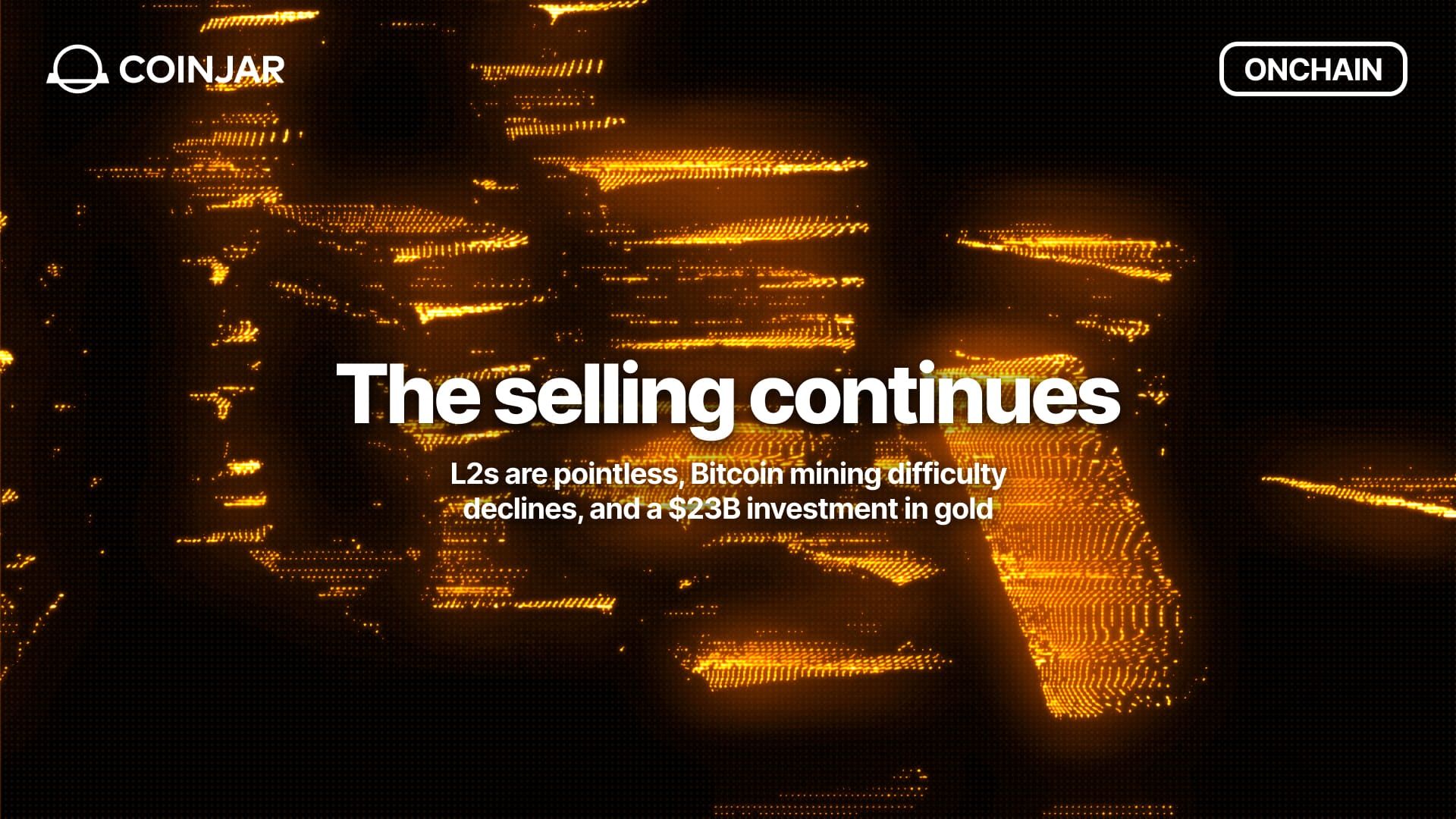Offchain: Attack of the Titans
June 29, 2023
Share this:

While crypto smoulders, some of the world’s biggest asset managers make their move.
You have to hand it to the bear market: it has a perverse sense of humour.
Here we are, deep in crypto’s most existential of winters, a time of bankruptcies, protocol collapse and 99% drawdowns, a time when allies are turning on each other, the culture has turned on us and the forces of government itself seem determined to crush the whole endeavour. And this? This is the time that the world’s largest asset manager decides to lodge a Bitcoin ETF? Ha ha ha, oh yes, very good.
So, is this the real deal? Have the big kids finally crashed the party? And is that a good thing?

I did not see that coming
After the myriad embarrassments of 2022, I presume I wasn’t alone in thinking that we could safely shelve the whole “institutional adoption” narrative in the forgotten books section, alongside “It’s X but on the blockchain” and “we’re banking the unbanked”.
So when BlackRock, a company that manages more than US$9 trillion in assets, announced that it had lodged a physical Bitcoin ETF (one that trades actual Bitcoin, rather than derivatives) with the SEC, it was about as unexpected as seeing a goose eat a water buffalo.
Now, BlackRock basically owns the ETF space. If it can be ETFed, BlackRock has made an ETF out of it. Their win-loss record when it comes to ETF approvals with the SEC is 575-1. They’re not here to give it a crack. They’re here to make it happen, dammit.
This was followed shortly after by the launch of EDX, a non-custodial crypto exchange, backed by Fidelity (US$4.5 trillion AUM), JPMorgan (US$3.67 trillion) and Charles Schwab (US$7.13 trillion in client assets). While not as attention grabbing as the BlackRock filing, it probably shouldn’t be undersold that some of the biggest financial firms in the world have made a deliberate move into a regulation focussed digital assets platform. Binance might not be for them, but you think Gensler’s gonna mess with Fidelity’s baby?
Oh and speaking of Fidelity, rumour is that they’re about to file their own Bitcoin ETF and/or buy out Grayscale with some loose change they found down the back of a couch. When they move, they move big.
The ups, the downs, the creamy middles
Prior to the BlackRock announcement, crypto was teetering over the abyss, the only visible narrative the one where regulators and crypto’s biggest players were about to have a Godzilla v Mothra style stompdown over Neo-Tokyo. The mood, to put it lightly, was grim.

Cut to two weeks later and Bitcoin is at its highest price in more than a year, charts are looking primed and optimism abounds. And who could blame us? By my count, this is basically the first good thing to happen to crypto since the ETH merge, and even that felt like a much needed good news story amid a vision-blocking blizzard of shit.
I’ve seen far too much to believe that it’s all gonna be milk and honey and Froot Loops from here on in. But this should be a backstop, a line in the sand that proves the oft-repeated claim that crypto ain’t going anywhere. And that’s worth something.
Good for Bitcoin, bad for crypto?
Back in 2017, the prospect of institutional adoption was a major talking point and I remember reading a comment where someone said, “You gotta understand: these guys operate on very different timescales to crypto. They might be interested, but they’re playing a long game the rest of us can’t even grasp.”
The timing, here in this most brutal of winters, almost certainly isn’t a coincidence. Fools rush in while the market is hot. The people managing trillions of dollars of the world’s assets wait until the fire has burned itself out, knowing they can pay pennies on the dollar for the ashes. Because all you need is a bit more kindling and those ashes will burn bright once again.
With its anti-establishment trappings and general air of DGAFedness, crypto has always had a vexed relationship with the prospect of institutional adoption. While everyone wants them green candles, the question of what might be lost in our submission to the TradFi titans is one that we’ve never quite known how to answer.
And when times were good, when we were powerful and sought after, it was easy to believe that they’d have to come to the table on our terms. But now, beaten and bedraggled, are we facing up to a version of crypto that will be defined by the Wall Street that we’ve set ourselves against for so long? Will crypto as we know it still exist? That could be the defining question of the next bull run.
But until then, enjoy this moment and the sweet, sweet sensation of not feeling like you’ve attached yourself to a heavy anchor plummeting towards the bottom of the ocean. Yeah. Feels good man.
Luke from CoinJar
The above article is not to be read as investment, legal or tax advice and takes no account of particular personal or market circumstances; all readers should seek independent investment, legal and tax advice before investing in cryptocurrencies. This article is provided for general information and educational purposes only. No responsibility or liability is accepted for any errors of fact or omission expressed therein. CoinJar, Inc. makes no representation or warranty of any kind, express or implied, regarding the accuracy, validity, reliability, availability, or completeness of any such information. Past performance is not a reliable indicator of future results.
Share this:
On/Offchain
Your weekly dose of crypto news & opinion.
Join more than 150,000 subscribers to CoinJar's crypto newsletter.
Your information is handled in accordance with CoinJar’s Privacy Policy.
More from CoinJar Blog

Onchain: In bad taste
February 25, 2026ICYMI, the tech bros have once again discovered taste, so get ready to be lectured by dudes who think it's acceptable to live with one ceiling light on what to wear and consume....Read more
Onchain: The selling continues
February 11, 2026Until morale improves, or so I hope. Story One L2s are pointless Tweets the guy who advocated for them as part of the Ethereum scaling roadmap. Perhaps to deflect from his...Read more
Onchain: Lots of things on sale
January 28, 2026Story One Crypto Social for Sale Been an interesting time to observe what happens to the still-standing crypto social networks. Aave, a leading DeFi protocol and creator of...Read moreYour information is handled in accordance with CoinJar’s Privacy Policy.
Copyright © 2025 CoinJar, Inc. All rights reserved.
CoinJar, Inc. is a registered Money Services Business with FinCEN and licensed as a money transmitter, NMLS #2492913. For a list of states in which CoinJar, Inc. is licensed or authorized to operate, please visit here. In certain other states, money transmission services are provided by Cross River Bank, Member FDIC.
This site is protected by reCAPTCHA and the Google Privacy Policy and Terms of Service apply.